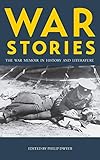War Stories : The War Memoir in History and Literature / ed. by Philip Dwyer.
Material type: TextPublisher: New York ; Oxford : Berghahn Books, [2016]Copyright date: ©2016Description: 1 online resource (334 p.)Content type:
TextPublisher: New York ; Oxford : Berghahn Books, [2016]Copyright date: ©2016Description: 1 online resource (334 p.)Content type: - 9781785333071
- 9781785333088
- Autobiography
- Biography as a literary form
- Military biography -- History
- Soldiers -- Biography -- History and criticism
- Soldiers' writings -- History and criticism
- War in literature
- HISTORY / Military / Wars & Conflicts (Other)
- History (General), Cultural Studies (General), Literary Studies, Memory Studies
- online - DeGruyter
| Item type | Current library | Call number | URL | Status | Notes | Barcode | |
|---|---|---|---|---|---|---|---|
 eBook
eBook
|
Biblioteca "Angelicum" Pont. Univ. S.Tommaso d'Aquino Nuvola online | online - DeGruyter (Browse shelf(Opens below)) | Online access | Not for loan (Accesso limitato) | Accesso per gli utenti autorizzati / Access for authorized users | (dgr)9781785333088 |
Frontmatter -- Contents -- Preface -- Chapter 1 Making Sense of the Muddle: War Memoirs and the Culture of Remembering -- Chapter 2 War Memoirs, Witnessing and Silence -- Chapter 3 ‘A Lively School of Writing’ George Gleig, Moyle Sherer and the Romantic Military Memoir -- Chapter 4 ‘The Tallest Pine in the Political Forest’ Race and Slavery in the Confederate Veteran’s Memoir, 1866–1915 -- Chapter 5 British Memoirs and Memories of the Great War -- Chapter 6 A Cog in the Machine of History? Japanese Memoirs of Total War (1937–45) -- Chapter 7 Post-Soviet Russian Memoirs of the Second World War -- Chapter 8 Reimagining the Yugoslav Partisan Epic -- Chapter 9 The War That Was Not 1948 Israeli War Memoirs -- Chapter 10 Remembering the ‘Endless’ Partition: From Memoirs about the 1947 Conflict to the Post-Memoir -- Chapter 11 ‘To Be Made Over’ Vietnamese-American Re-education Camp Narratives -- Chapter 12 Memoir Writing as Narrative Therapy: A South African Border War Veteran’s Story -- Chapter 13 Pugnacity, Pain and Professionalism: British Combat Memoirs from Afghanistan, 2006–14 -- Index
restricted access online access with authorization star
http://purl.org/coar/access_right/c_16ec
Although war memoirs constitute a rich, varied literary form, they are often dismissed by historians as unreliable. This collection of essays is one of the first to explore the modern war memoir, revealing the genre’s surprising capacity for breadth and sophistication while remaining sensitive to the challenges it poses for scholars. Covering conflicts from the Napoleonic era to today, the studies gathered here consider how memoirs have been used to transmit particular views of war even as they have emerged within specific social and political contexts.
Mode of access: Internet via World Wide Web.
In English.
Description based on online resource; title from PDF title page (publisher's Web site, viewed 25. Jun 2024)


